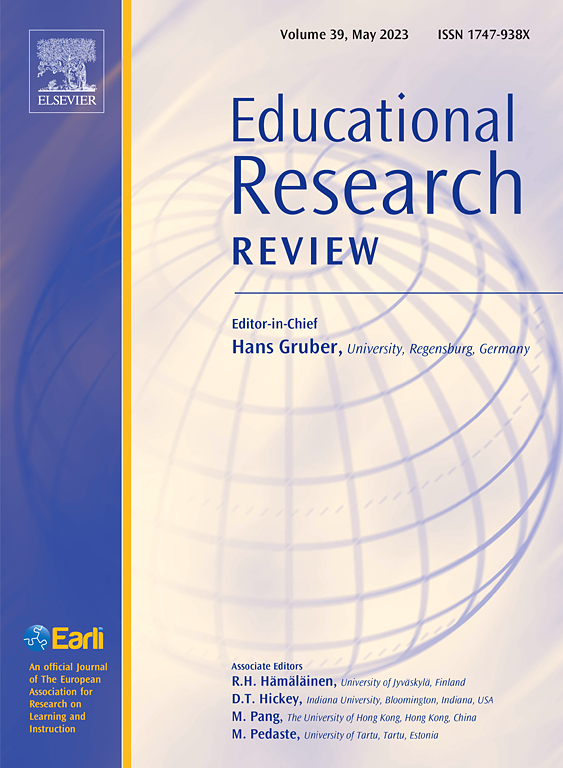The impact of GenAI on learning outcomes: A systematic review and meta-analysis of experimental studies
IF 10.6
1区 教育学
Q1 EDUCATION & EDUCATIONAL RESEARCH
引用次数: 0
Abstract
Generative Artificial Intelligence (GenAI) tools such as ChatGPT, Claude, and Gemini are increasingly being integrated into educational environments, prompting questions about their actual impact on student learning. While a growing body of literature reports anecdotal or correlational evidence of GenAI's educational potential, rigorous causal evaluations remain limited. To bridge this gap, this study conducted a systematic review and meta-analysis of experimental and quasi-experimental studies investigating the effect of GenAI on learning outcomes. Following PRISMA guidelines, we screened five academic databases and identified 68 relevant studies published between 2022 and 2025. These studies yielded a total of 337 effect sizes across various educational levels, subject domains, and instructional contexts. The meta-analysis revealed a moderate overall positive effect of GenAI on learning outcomes (SMD = 0.45, 95 % CI [0.43, 0.47]), suggesting that GenAI-supported interventions are generally more effective than traditional instruction. However, substantial heterogeneity was observed across studies (I2 = 95 %), indicating that the magnitude of GenAI's impact varies significantly depending on contextual and methodological factors. Moderator analyses revealed stronger effects in primary and secondary education, within natural science disciplines, and in short-term interventions with smaller sample sizes. These patterns point to both the promise and the complexity of GenAI integration in educational practice. In conclusion, while GenAI shows considerable promise for enhancing learning outcomes, its true potential will only be realized through sustained, efforts to evaluate how, when, and for whom these technologies work best in diverse learning ecosystems.
GenAI对学习结果的影响:实验研究的系统回顾和荟萃分析
ChatGPT、Claude和Gemini等生成式人工智能(GenAI)工具正越来越多地集成到教育环境中,这引发了人们对它们对学生学习的实际影响的质疑。虽然越来越多的文献报道了GenAI教育潜力的轶事或相关证据,但严格的因果评估仍然有限。为了弥补这一差距,本研究对研究GenAI对学习结果影响的实验和准实验研究进行了系统回顾和荟萃分析。根据PRISMA指南,我们筛选了五个学术数据库,并确定了2022年至2025年间发表的68项相关研究。这些研究在不同的教育水平、学科领域和教学环境中产生了总共337个效应值。荟萃分析显示,GenAI对学习结果有中等程度的总体积极影响(SMD = 0.45, 95% CI[0.43, 0.47]),这表明GenAI支持的干预措施通常比传统教学更有效。然而,在所有研究中观察到大量的异质性(I2 = 95%),表明GenAI的影响程度因环境和方法因素而有很大差异。调节分析显示,在中小学教育、自然科学学科和样本量较小的短期干预中,影响更强。这些模式既表明了GenAI在教育实践中的应用前景,也表明了其复杂性。总之,虽然GenAI在提高学习成果方面显示出巨大的希望,但只有通过持续努力评估这些技术在不同的学习生态系统中如何、何时以及为谁发挥最佳作用,才能实现其真正的潜力。
本文章由计算机程序翻译,如有差异,请以英文原文为准。
求助全文
约1分钟内获得全文
求助全文
来源期刊

Educational Research Review
EDUCATION & EDUCATIONAL RESEARCH-
CiteScore
19.40
自引率
0.90%
发文量
53
审稿时长
57 days
期刊介绍:
Educational Research Review is an international journal catering to researchers and diverse agencies keen on reviewing studies and theoretical papers in education at any level. The journal welcomes high-quality articles that address educational research problems through a review approach, encompassing thematic or methodological reviews and meta-analyses. With an inclusive scope, the journal does not limit itself to any specific age range and invites articles across various settings where learning and education take place, such as schools, corporate training, and both formal and informal educational environments.
 求助内容:
求助内容: 应助结果提醒方式:
应助结果提醒方式:


